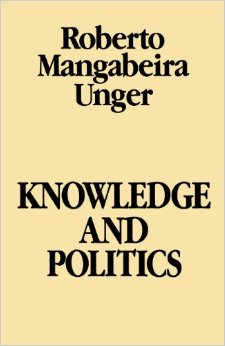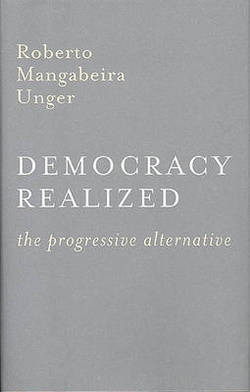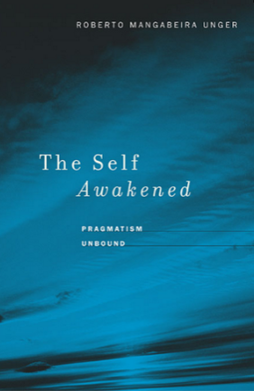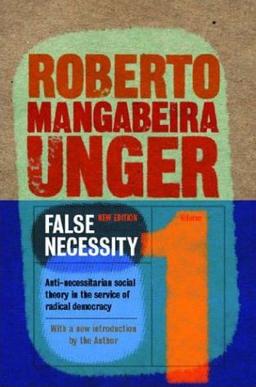Related Research Articles
"Negative capability" is the capacity of artists to pursue ideals of beauty, perfection and sublimity even when it leads them into intellectual confusion and uncertainty, as opposed to a preference for philosophical certainty over artistic beauty. The term, first used by John Keats in 1817, has been subsequently used by poets, philosophers and literary theorists to describe the ability to perceive and recognize truths beyond the reach of what Keats called "consecutive reasoning".
Critical legal studies (CLS) is a school of critical theory that developed in the United States during the 1970s. CLS adherents claim that laws are devised to maintain the status quo of society and thereby codify its biases against marginalized groups.
Social theories are analytical frameworks, or paradigms, that are used to study and interpret social phenomena. A tool used by social scientists, social theories relate to historical debates over the validity and reliability of different methodologies, the primacy of either structure or agency, as well as the relationship between contingency and necessity. Social theory in an informal nature, or authorship based outside of academic social and political science, may be referred to as "social criticism" or "social commentary", or "cultural criticism" and may be associated both with formal cultural and literary scholarship, as well as other non-academic or journalistic forms of writing.
In the social sciences there is a standing debate over the primacy of structure or agency in shaping human behaviour. Structure is the recurrent patterned arrangements which influence or limit the choices and opportunities available. Agency is the capacity of individuals to act independently and to make their own free choices. The structure versus agency debate may be understood as an issue of socialization against autonomy in determining whether an individual acts as a free agent or in a manner dictated by social structure.

Roberto Mangabeira Unger is a Brazilian philosopher, jurist and politician. His work is in the tradition of classical social theory and pragmatism, and is developed across many fields including legal theory, philosophy and religion, social and political theory, progressive alternatives, and economics. In natural philosophy he is known for The Singular Universe and the Reality of Time. In social theory he is known for Politics: A Work in Constructive Social Theory. In legal theory he was associated with the Critical Legal Studies movement, which helped disrupt the methodological consensus in American law schools. His political activity helped the transition to democracy in Brazil in the aftermath of the military regime, and culminated with his appointment as Brazil's Minister of Strategic Affairs in 2007 and again in 2015. His work is seen to offer a vision of humanity and a program to empower individuals and change institutions.
Formative contexts are the institutional and imaginative arrangements that shape a society's conflicts and resolutions. They are the structures that limit both the practice and the imaginative possibilities in a socio-political order, and in doing so shape the routines of conflict over social, political and economic resources that govern access to labor, loyalty, and social station, e.g. government power, economic capital, technological expertise, etc. In a formative context, the institutions structure conflict over government power and capital allocation, whereas the imaginative framework shapes the preconceptions about possible forms of human interaction. Through this, a formative context further creates and sustains a set of roles and ranks, which mold conflict over the mastery of resources and the shaping of the ideas of social possibilities, identities and interests. The formative context of the Western democracies, for example, include the organization of production through managers and laborers, a set of laws administering capital, a state in relation to the citizen, and a social division of labor.
Radical democracy is a type of democracy that advocates the radical extension of equality and liberty. Radical democracy is concerned with a radical extension of equality and freedom, following the idea that democracy is an unfinished, inclusive, continuous and reflexive process.

Cui Zhiyuan, born in Beijing in 1963, is a professor at the School of Public Policy and Management in Tsinghua University, Beijing, and a leading member of the Chinese New Left through his work on alternatives to neo-liberal capitalism.
Articles in social and political philosophy include:

Passion: An Essay on Personality is a philosophical inquiry into human nature by Brazilian philosopher and politician Roberto Mangabeira Unger. The book explores the individual and his relation to society, asking how one comes to an understanding of self and others. Unger here sees the root human predicament as the need to establish oneself as a unique individual in the world but at the same time to find commonality and solidarity with others. This exploration is grounded in what Unger calls a modernist image of the human being as one who lives in context but is not bound by context.
Empowered democracy is a form of social-democratic arrangements developed by Brazilian philosopher and politician Roberto Mangabeira Unger, who first published his theories in 1987. Theorized in response to the repressiveness and rigidity of contemporary liberal democratic society, the theory of empowered democracy envisions a more open and more plastic set of social institutions through which individuals and groups can interact, propose change, and effectively empower themselves to transform social, economic, and political structures. The key strategy is to combine freedom of commerce and governance at the local level with the ability of political parties at the central level to promote radical social experiments that would bring about decisive change in social and political institutions.

Knowledge and Politics is a 1975 book by philosopher and politician Roberto Mangabeira Unger. In it, Unger criticizes classical liberal doctrine, which originated with European social theorists in the mid-17th century and continues to exercise a tight grip over contemporary thought, as an untenable system of ideas, resulting in contradictions in solving the problems that liberal doctrine itself identifies as fundamental to human experience. Liberal doctrine, according to Unger, is an ideological prison-house that condemns people living under its spell to lives of resignation and disintegration. In its place, Unger proposes an alternative to liberal doctrine that he calls the "theory of organic groups," elements of which he finds emergent in partial form in the welfare-corporate state and the socialist state. The theory of organic groups, Unger contends, offers a way to overcome the divisions in human experience that make liberalism fatally flawed. The theory of organic groups shows how to revise society so that all people can live in a way that is more hospitable to the flourishing of human nature as it is developing in history, particularly in allowing people to integrate their private and social natures, achieving a wholeness in life that has previously been limited to the experience of a small elite of geniuses and visionaries.

The Critical Legal Studies Movement is a book by the philosopher and politician Roberto Mangabeira Unger. First published in 1983 as an article in the Harvard Law Review, published in book form in 1986, and reissued with a new introduction in 2015, The Critical Legal Studies Movement is a principal document of the American critical legal studies movement that supplied the book with its title. In the book, Unger argues that law and legal thought offers unrealized possibilities for the self-construction of a more democratic society, and that many lawyers and legal theorists have uncritically surrendered to constraints that undermine their ability to make use of law's transformative potential. Unger explains how the critical legal studies movement has refined and reformulated the major themes of leftist and progressive legal theorists, namely the critique of formalism and objectivism in legal doctrine, and the purely instrumental use of legal practice and doctrine to advance leftist aims, and in doing so, has identified elements of a constructive program for the reconstruction of society.

What Should Legal Analysis Become? is a book by philosopher and politician Roberto Mangabeira Unger. First published in 1996, the book germinated from lectures Unger gave at Yale Law School, Columbia Law School, and the London School of Economics. In the book, Unger argues that in order to transform society to be more radically democratic, it is necessary to penetrate the specialized professions so that we can talk about, and imagine, institutions effectively. Unger focuses on the legal profession in this book, setting forth a vision of law as "institutional imagination." He presents a program for changing the nature of the legal profession so that less power is vested in legal professionals and institutions, and legal analysis is reoriented to be more egalitarian and advance more effectively the democratic project.

The Religion of the Future is a book by the philosopher and politician Roberto Mangabeira Unger. In the book, he argues that humanity is in need of a religious revolution that dispenses with the concept of God and elements of the supernatural, a revolution that expands individual and collective human empowerment by fostering a condition he calls "deep freedom"—a life of creativity, risk, experiment, and meaningful personal connection—protected by structure-revising social and political structures of an empowered democracy hospitable to the context-breaking capacities inherent in human life.

Democracy Realized: The Progressive Alternative is a 1998 book by philosopher and politician Roberto Mangabeira Unger. In the book, Unger sets forth a program of "democratic experimentalism" that challenges and defies the neoliberal consensus that there are few alternatives for the progressive reform of democratic and market structures.

The Self Awakened: Pragmatism Unbound is a 2007 book by philosopher and politician Roberto Mangabeira Unger. In the book, Unger sets forth a theory of human nature, a philosophical view of time, nature and reality, and a proposal for changes to social and political institutions so that they best nourish the context-transcending quality that Unger sees at the core of human existence. Written in a prophetic and poetic manner that drew comparison with the work of Whitman and Emerson, and delving into issues of humankind's existential predicament in a manner that one critic found evocative of Sartre, The Self Awakened also serves as a summation of many of the core principles of Unger's work.

Law in Modern Society: Toward a Criticism of Social Theory is a 1976 book by philosopher and politician Roberto Mangabeira Unger. In the book, Unger uses the rise and decline of the rule of law as a vehicle to explore certain problems in social theory. According to Unger, problems that were central concerns of classical social theorists like Marx, Durkheim, and Weber—the problems of explanation, order, and modernity—remain unsolved. Unger contends that the failure of classical social theory to solve these dilemmas can be traced to the way in which it asserted its independence from the ancient political philosophers, namely in its denial of a supra-historical human nature and in its insistence upon the contrast of fact and value. Unger argues that a radical reorientation of social theory is needed to solve the problems it faces. "To carry out its own program," Unger writes, "social theory must destroy itself." The rise and decline of the rule of law, and the dilemmas of social theory, converge in the need to be able to compare and criticize different forms of society, in order to be able to more effectively submit the organization of society to the human will.

Politics: A Work in Constructive Social Theory is a 1987 book by Brazilian philosopher and politician Roberto Mangabeira Unger. In the book, Unger sets out a theory of society as artifact, attempting to complete what he describes as an unfinished revolution, begun by classic social theories such as Marxism, against the naturalistic premise in the understanding of human life and society. Politics was published in three volumes: False Necessity: Anti-Necessitarian Social Theory in the Service of Radical Democracy, the longest volume, is an explanatory and programmatic argument of how society might be transformed to be more in keeping with the context-smashing potential of the human imagination; Social Theory: Its Situation and Its Task, is a "critical introduction" that delves into issues of social science underpinning Unger's project; and Plasticity Into Power: Comparative-Historical Studies on the Institutional Conditions of Economic and Military Success, is a collection of three historical essays illuminating the theoretical points Unger advanced in the first two volumes. In 1997, an abridged, one-volume edition of Politics was issued as Politics, The Central Texts, edited by Zhiyuan Cui.

The Left Alternative is a 2009 book by philosopher and politician Roberto Mangabeira Unger. In the book, Unger identifies problems with contemporary leftism and proposes a way to achieve the goals that he believes should be central to the progressive cause: inclusive economic growth through the heating up of politics and democratizing the market economy, a relentless process of institutional innovation that depends less upon crisis for change, and depends more on shortening the distance between context-preserving and context-transforming moves. The Left Alternative was first published in 2006 as What Should the Left Propose?
References
- 1 2 3 Unger, Robero Mangabeira, False necessity: anti-necessitarian social theory in the service of radical democracy: from Politics, a work in constructive social theory (London: Verso, 2004), xvii.
- ↑ See Unger, Roberto Mangabeira. 1987. Social Theory: Its Situation and Its Task. Politics 2. New York: Verso; Unger, Roberto Mangabeira. 1987. False Necessity: Anti-necessitarian Social Theory in the Service of Radical Democracy. Politics, a Work in Constructive Social Theory. London: Verso; Unger, Roberto Mangabeira. 1987. Plasticity into Power: Comparative-historical Studies of the Institutional Conditions of Economic and Military Success. Cambridge: Cambridge University Press.
- ↑ This background is drawn from Ian Shapiro, "Review: Constructing Politics," Political Theory 17, no. 3 (1989): 475-482, Roberto Mangabeira Unger, Social Theory: Its Situation and its Task, Politics 2 (New York: Verso, 1987), Bernard Yack, The longing for total revolution: philosophic sources of social discontent from Rousseau to Marx and Nietzsche (Princeton, N.J: Princeton University Press, 1986), Bernard Yack, "Review: Toward a Free Marketplace of Social Institutions: Roberto Unger's 'Super-Liberal' Theory of Emancipation," Harvard Law Review 101, no. 8 (June 1, 1988): 1961-1977.
- ↑ Unger, Roberto Mangabeira, False necessity: anti-necessitarian social theory in the service of radical democracy: from Politics, a work in constructive social theory, second edition (London: Verso, 2004).
- ↑ Collins, Hugh. 1987. "Roberto Unger and the Critical Legal Studies Movement." Journal of Law and Society 14.
- 1 2 Unger, Roberto Mangabeira, Social Theory: Its Situation and its Task, Politics 2 (New York: Verso, 1987), chapter 5.
- ↑ Unger, Roberto Mangabeira, Social Theory: Its Situation and its Task, Politics 2 (New York: Verso, 1987), chapter 7.
- ↑ Unger, Robero Mangabeira, False necessity: anti-necessitarian social theory in the service of radical democracy: from Politics, a work in constructive social theory (London: Verso, 2004), xix.
- ↑ Hutchinson, Allan C. "Review: A Poetic Champion Composes: Unger (Not) on Ecology and Women." The University of Toronto Law Journal 40, no. 2 (April 1, 1990): 275.
- ↑ Unger, Roberto Mangabeira. Democracy realized: the progressive alternative. London: Verso, 1998
- ↑ Unger, Roberto Mangabeira. Free trade reimagined: the world division of labor and the method of economics. Princeton: Princeton University Press, 2007
- ↑ Unger, Roberto Mangabeira. The future of American progressivism: an initiative for political and economic reform. Boston: Beacon Press, 1998
- ↑ Unger, Roberto Mangabeira. The left alternative. London: Verso, 2009.
- ↑ Press, Eyal (March 1999). "The Passion of Roberto Unger". Lingua Franca. Retrieved 4 July 2011.
- ↑ Barrionuevo, Alexei (2008-02-02). "'Minister of Ideas' Tries to Put Brazil's Future in Focus". The New York Times . Retrieved 2008-02-02.
- ↑ Rorty, Richard. "Unger, Castoriadis, and the Romance of a National Future." Northwestern University Law Review 82 (1988 1987).
- ↑ Trubek, David M. "Radical Theory and Programmatic Thought." American Journal of Sociology 95, no. 2 (1989): 447.
- ↑ Yack, Bernard. "Review: Toward a Free Marketplace of Social Institutions: Roberto Unger's 'Super-Liberal' Theory of Emancipation." Harvard Law Review 101, no. 8 (June 1, 1988): 1973.